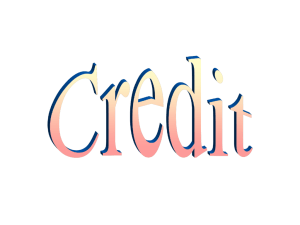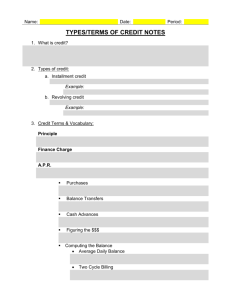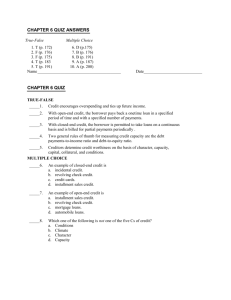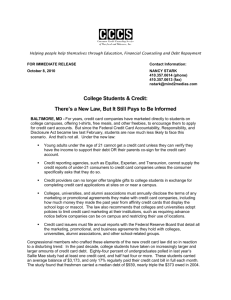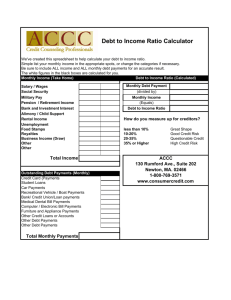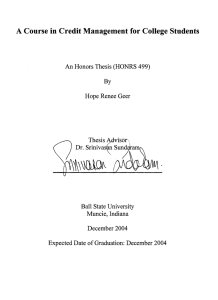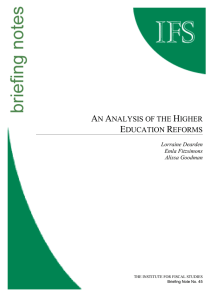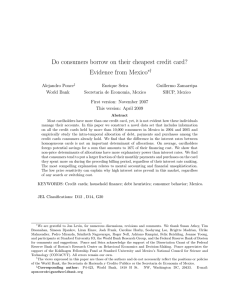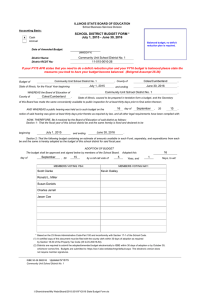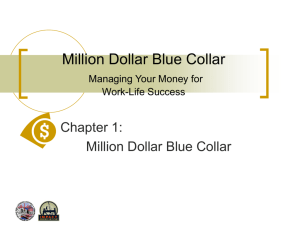Money Matters - Kentucky Wesleyan College
advertisement
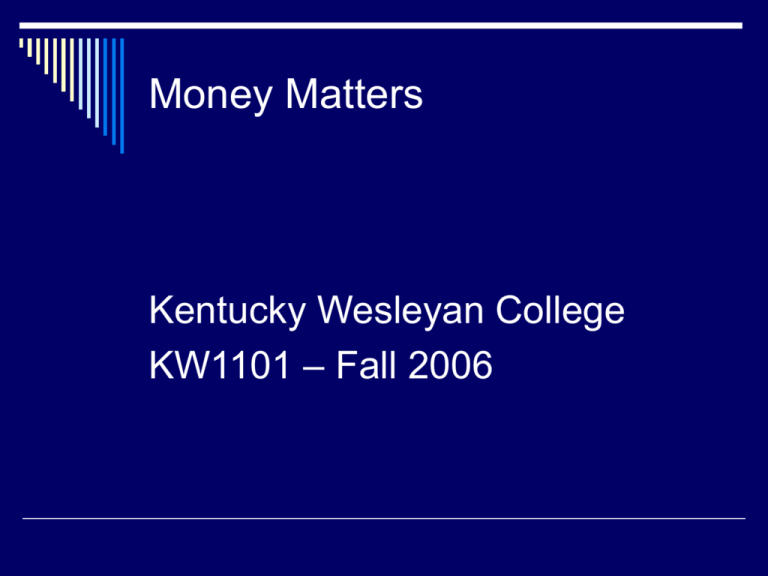
Money Matters Kentucky Wesleyan College KW1101 – Fall 2006 Facts There were nearly 1,500,000 personal bankruptcies in the US in 2001--95% of these were declared “no-asset” cases. Keep in mind that new bankruptcy laws (effective in October 2005) now make it harder to file for bankruptcy. So, you’ll have to pay for what you charge ….even if that means you’re still paying for pizza you ate in college when you’re in your 30’s. Student Credit Card Debt The average undergraduate has $2,200 in credit card debt (Nellie Mae-2004). The average graduate student has $5,800 in credit card debt. If you fall behind on your payments, you get slammed with HIGH late fees. High credit card debt also affects your ability to make your student loan payments. It may also affect your ability to buy a car and/or a home when you graduate. Student Credit Card Debt One consequence of high credit card debt is an increase in student dropouts so the student can work more to meet the minimum payment requirements (State of Iowa, 2000). Students with high debt levels also tend to have higher anxiety levels than other students which may lead to multiple personal problems. What can you do to avoid some of these financial worries? Facts Seventy percent (70%) of Americans live from paycheck to paycheck with no savings! According to the Department of Commerce, the personal savings rate in 2000 was (2.2%), the lowest rate in 60 years. According to the Ladies Home Journal- the average household receives 43 credit card offers per year. USA Today reported that Citibank spent $10 million marketing credit cards to high school and college students in 2002. Cash or Credit? According to a Dunn and Bradstreet study, people using cash tend to spend 12%-18% less than those using credit. Decide if this is a need or a want? Calculate what buying on credit is really costing you. Will this purchase make me happy today? Tomorrow? Cash or Credit? Are there additional expenses related to the initial purchase? Avoid impulse purchases - Stress and/or a hectic schedule tend to push us towards impulse purchases. Do NOT charge more than you can pay off in full each month! Credit Card Myths I need a credit card to help “build my credit.” I can’t rent a car or book a hotel room without a credit card. I will only use the card for emergencies- and then pay it off every month to avoid finance charges. Credit Cards Facts Revolving credit does not necessarily improve your credit and can negatively affect your credit score. A debit card will allow you to rent a car, book a hotel room and make phone or internet purchases. 78% of Americans do not pay their credit card balances in full each month. Credit Cards are NOT “Free Money” They are really high interest loans and may impose the following types of fees on you! Finance Charge: an interest charge (as high as 20+%) on the unpaid portion or the average monthly balance on your bill each month Annual Fee: a yearly fee charged by some companies varying from $20-100. Cash Advance Fee: avoid cash advances because fees are steep and the company usually charges a higher interest rate than the normal finance interest rate Late Payment Fee: a flat fee around $35; may also result in your finance interest rate increasing Credit Cards – The Math A Sears charge has a 21.4% interest rate and minimum payment of 2.22% per month. So, let us put $1000 on a Sears charge and make the minimum payment. How long will it take to pay this off? Credit Cards – The Math According to bankrate.com’s calculator, it will take 192 months (16 years) and will cost $1694 in finance charges. So…do you really need that item right now? Consequences of Late/No Payments The credit card company reports both positive & negative information to three credit reporting agencies (Equifax, Experian & TransUnion) Information reported includes: Original balance Payment history - Current balance - Collections/legal Consequences of Late/No Payments Many employers run a credit check on potential new employees because research shows that people with bad credit are more likely to steal from their employers So, negative information on your credit report may keep you from your “dream job” when you graduate Also, You may not be approved for a loan for a new car and/or house because of a bad credit report Closing Remarks Before getting/using a credit card, know that you have to eventually pay for any items you charge. If you only make minimum payments, you may pay more than twice the original cost of the item. Failing to make timely minimum payments will hurt your credit rating and may prevent you from getting your “dream job” when you graduate. If you incur high credit card balances, it increases the likelihood that you will not finish college which will make paying off those balances even harder. References Barry Myers, Republic Bank www.nelliemae.com www.bankrate.com www.state.ia.us/government/ag/consumer/advisorie s/student_creditcard.html
